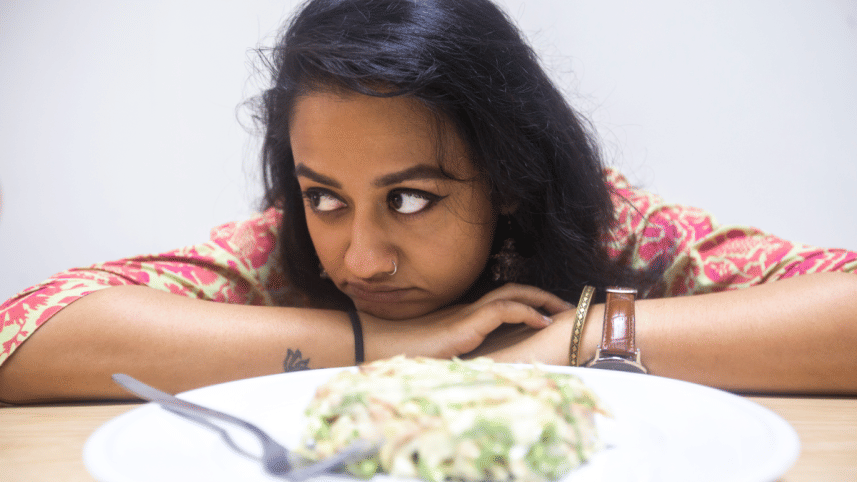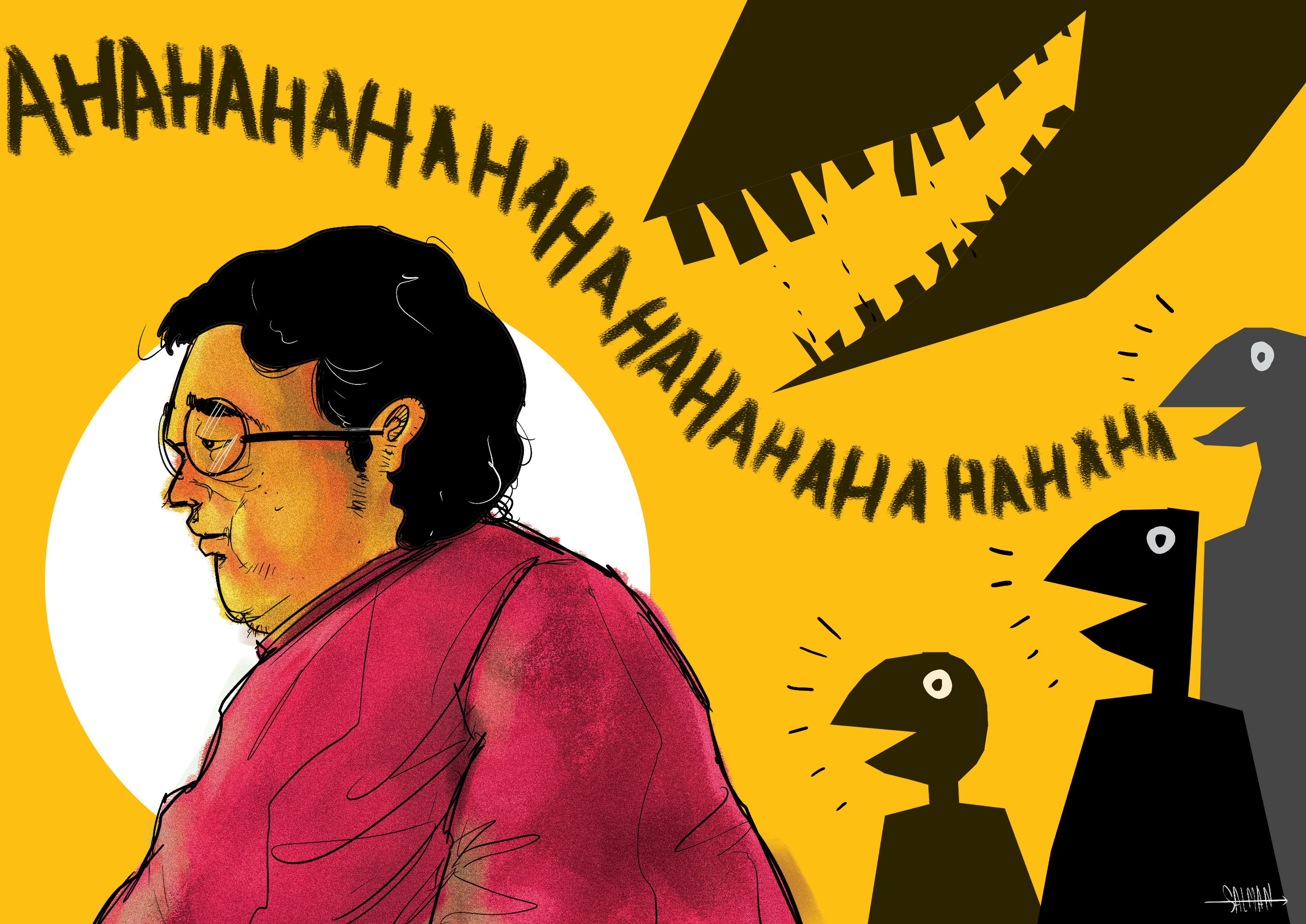Living with an eating disorder

Trigger warning: mentions and/or graphic details of eating disorders
An eating disorder can refer to any of a range of psychological disorders, characterised by abnormal or disturbed eating habits. They might start with an obsession with food, body weight, or body shape. In severe cases, eating disorders can cause serious health consequences and may even be fatal if left untreated.
Contrary to popular belief and regardless of cultural background, people in Bangladesh are susceptible to eating disorders too, particularly anorexia nervosa and bulimia nervosa. According to a recent study by National Center for Biotechnology Information (NCBI), about one in four students were reported at risk of eating disorders in a public university in Bangladesh. Private university students in Bangladesh showed a 37.6 percent risk.
Despite these figures, people tend to latch onto misconceptions. Many refuse to acknowledge or educate themselves regarding the existence of eating disorders.
Women are at a higher risk for developing an eating disorder compared to men, as society places a higher concern on physical appearance and body image for them.
However, these disorders are becoming increasingly common amongst men and gender nonconforming people. These populations often seek treatment at lower rates or may not report their eating disorder symptoms at all.
"A desire to be attractive is a feeling reserved for women in our society. We're told to deal with body dysmorphia by just not caring about our experiences with appearance. For the longest time, I convinced myself I was fine despite extremely unhealthy eating habits. It did not occur to me that men were susceptible too, until much later," laments Kazi Nahiyan Nabi (18), a student at South Breeze School.
Cultural aspects significantly contribute to triggering eating disorders for many.
Social gatherings, or dawats, are particularly challenging for someone with any form of disordered eating. Food being the focal point of these events in our culture may spark anxiety for many, conversations surrounding food at these events may feel internally isolating.
People being unaware of these disorders altogether have serious consequences. Relatives throwing snarky remarks in regards to people's bodies may seem harmless initially. For people with distorted body image, these comments can pose danger.
When it comes to comments like these, 23-year-old Fatima Jahan Ena, third-year student at North South University shares, "Family members, friends, or even complete strangers often negatively point out someone's physical features, without giving it a second thought. This is a very common scenario in our culture. I've had relatives scrutinise my appearance daily. Since anorexia can create a fear of gaining weight, these comments ended up acting as triggers."
As a result, she recalls going to great lengths while restricting her diet. She mentions how she did not finish a single meal in a day and exercised to the point where she was close to passing out.
Dr Mithila Khandaker, consultant psychologist currently practising at Lifespring Healthcare Centre talks about trends observed, when asked about her experience with eating disorder patients during her clinical practice. According to her, bullying in regards to appearance and body weight seems to be prevalent in most patients.
She adds how patients generally lack self-esteem and are greatly influenced by opinions and comments.
Farah Abrity, a third-year student majoring in Engineering Management at Thammasat University, Bangkok, talks about the dreadful effects of eating disorders and navigates us through her journey.
She had been struggling with tendencies that were clear signs of an underlying eating disorder for over ten years. Her clinical diagnosis of binge eating disorder, body dysmorphic disorder and depression happened as recently as a year ago. Her experience paints a clear illustration of how alienating experiencing such illnesses are in Bangladesh.
"I was the only chubby child out of three sisters. I grew up listening to comments about my weight and suggestions to follow my sisters' eating habits. Starting from sixth grade, I developed a dysfunctional relationship with food and ever since then, I spent the years overly restricting all kinds of food. When my body could not take that anymore, I would be constantly bingeing on food," she says.

Due to uncertainty over lockdowns, she chose to stay in Thailand during the mandatory quarantine periods in 2020.
"Quarantining all alone took a big toll on my mental health and I could not help but binge eat to cope. Over the course of a year, I gained 30 kgs before having to return to Bangladesh for my sister's wedding. Having to face family and society at large with my changed appearance was a harrowing experience, for no one could be expected to understand that I did not have control over this. Upon my return, every interaction I had met this expectation," she reflects.
It is ironic that there seems to be no room for people with eating disorders when dawats are supposed to be a celebration based on appreciating loved ones.
When courtesy is cautiously examined through your relationship to food, and the amount on your plate becomes a parameter for self-worth, do you give up on these conventionally fun gatherings altogether? How much empathy does the community have for eating disorders? Unsurprisingly, not so much.
Farah generally wanted to avoid dawats, a common situation seen amongst a lot of other patients.
"My parents would try to force me to go, which led to two incidents where I had mental breakdowns about insecurities about my changed appearance, and feeling overwhelmed by all the rich food. They only blamed me and asked why I didn't lose all that weight before returning home," she says.
Friends and relatives alike refused to understand that Farah was subject to mental illnesses. They suggested that she see nutritionists instead of psychiatrists and get checked for hormonal imbalances, which might have led to her difficulties with food.
"The problem with our society is that we refuse to empathise with people suffering from problems we aren't familiar with and do not understand," Farah states as she concludes her story.
A.R. Faith* (18) says how people would threaten to put them through tube feeding if they refused to taste curry-based dishes – a cultural favourite. They mention having a preference for bland food, especially on days when their appetite is exceptionally low.
"Besides being frightening, intimidating statements like this filled me up with guilt. It made me think it was my fault for being mentally unable to try certain types of food, no matter how hard I tried," they add.
The struggles are quite often shrugged off using phrases which suggest that the person is somehow responsible for, or in control of their eating habits. This further reinforces the guilt, shame and stigma surrounding eating disorders.
People may argue that they are concerned about their loved ones. However, airing out concerns in the form of mockery, especially coming from a place that thrives in misinformation and insensitivity, is unsolicited. This may worsen eating disorders and in severe cases, lead to body dysmorphic disorder.
Parents should also trust their instincts when it comes to eating disorders in their children, in addition to educating themselves about basic eating disorder information. Eating disorders can thrive in secrecy, but parents often intuitively know if something is wrong with their children. If concern arises, consulting with a specialist and early intervention is critical to effective eating disorder recovery.
Due to the complexity of eating disorders, recovery can take months, or even years. But with treatment, recovery is absolutely possible.
We asked patients what cultural shifts would help those battling eating disorders.
Faith says that the increasing obsession with the notion of body positivity seems unrealistic.
"On bad days, people won't be absolutely in love with their bodies. And that is okay. It is important that people are taught to accept their bodies first. This lessens the pressure to chase perfection and go to extremes when it comes to controlling eating habits, at least for me," she says.
"Our ingrained practice of body-shaming plays a big role here. Kids don't often think about their bodies that much and oftentimes, they grow to view it in a negative light because of scrutinising comments from family members," says Fatima.
What else can we do if our loved ones have an eating disorder?
For starters, we should not reinforce people's negative self-image any further by ridiculing their struggles. We should not promote diet culture or dish out unsolicited advice that has not been verified by a medical professional. When in doubt, we can ask respectful questions.
If a loved one is struggling, educating yourself, alongside simply being there for them may do more than you realise. Lastly, their relationship with food does not, in any way, transcribe to their love for you.
*Names have been changed for privacy
Shanum closely resembles a raccoon, send her reasons to cut down on caffeine at shanumsarkar18@gmail.com
Amrin Tasnim Rafa is always confused, it's literally her dominant personality trait. This is maybe her email, she can't be sure: amrinrafa@gmail.com




 For all latest news, follow The Daily Star's Google News channel.
For all latest news, follow The Daily Star's Google News channel. 

Comments